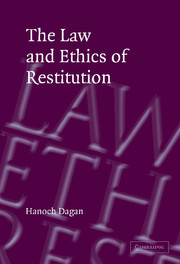Book contents
- Frontmatter
- Contents
- Acknowledgments
- Table of cases
- Table of statutes and treaties
- 1 Introduction
- 2 Preventing unjust enrichment
- 3 Mistakes
- 4 Other-regarding conferrals of benefits
- 5 Self-interested conferrals of benefits
- 6 Restitution in contexts of informal intimacy
- 7 Wrongful enrichments
- 8 Restitution in a contractual context
- 9 Restitution in bankruptcy
- 10 Reasons for restitution
- Bibliography
- Index
1 - Introduction
Published online by Cambridge University Press: 05 July 2009
- Frontmatter
- Contents
- Acknowledgments
- Table of cases
- Table of statutes and treaties
- 1 Introduction
- 2 Preventing unjust enrichment
- 3 Mistakes
- 4 Other-regarding conferrals of benefits
- 5 Self-interested conferrals of benefits
- 6 Restitution in contexts of informal intimacy
- 7 Wrongful enrichments
- 8 Restitution in a contractual context
- 9 Restitution in bankruptcy
- 10 Reasons for restitution
- Bibliography
- Index
Summary
Two of the most publicly salient litigation patterns of recent years – the claims of victims of slavery against corporations that benefitted from their slave labor, and the suits of governments against injurious industries for the prevention and amelioration costs they incurred in dealing with harms which were arguably caused to their citizens by the defendant industries – share one common denominator. Both invoke restitution, loosely defined in this book as the body of law dealing with benefit-based liability or benefit-based recovery.
This book discusses the American law of restitution in an attempt to expose and examine critically some of its underlying normative commitments. Writing a book on restitution in a US environment is a risky (but hopeful) enterprise. To be sure, “Americans led the way in the development of the modern law” of restitution and the “sense that they were at the frontier of the law of restitution endured into the 1950s and 1960s.” In those days restitution was a hot topic in the American law school environment: a standard part of the upper-year curriculum, and a matter of considerable academic interest. But this is no longer the case. Only a bare handful of American law schools offer a restitution course these days, and few academics write in this area. Restitution was subsumed under the general category of remedies or dissipated into the interstices of property, torts, and contract. As a consequence, many American lawyers and judges are unfamiliar with the law of restitution.
- Type
- Chapter
- Information
- The Law and Ethics of Restitution , pp. 1 - 10Publisher: Cambridge University PressPrint publication year: 2004



